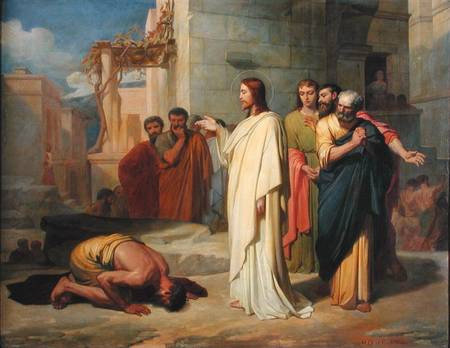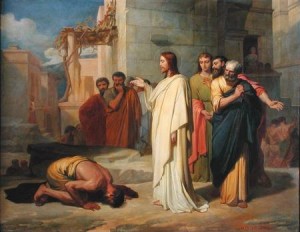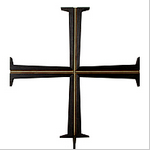Leviticus 13:1-2, 44-46
Psalm 32 1-2, 5, 11
1 Corinthians 10:31-11:1
Mark 1:40-45
“If you wish, you can make me clean.” The leper’s words echo through the centuries. They are simple, but they say much. They speak his knowledge of his uncleanness, the need for help overcoming his disease, and the faith that the cure is within Christ’s power to give. “If you wish, you can make me clean.”
This semester, I am co-teaching a course called “Race, Marginality, and Theologies of Liberation.” This has me reading about and discussing with college sophomores the long legacy of race-based exclusion and marginality in the history of the Church and the West more generally. Books such as David Nirenberg’s Anti-Judaism: The Western Tradition and Willie James Jennings’ The Christian Imagination: Theology and the Origins of Race are providing us with a theological and historical framework for the long history of exclusionary practices and their sources in and influences upon theological thought. Some of the students seem to be feeling a bit overwhelmed by the sheer weight of the extensive history of injustices that we are reading about; others seem ready to shrug them off, as it seems like ancient history. Both groups are rather desperate to know what it is that they can do to right the wrongs and help everyone move forward in a more just world. The problems seem immense and the solutions so difficult to come by. It is easy to be overwhelmed.
It strikes me, though, in reading the readings this week, that the leper who approaches Jesus may be a model for us. He approaches Jesus humbly, on his knees, with his simple message, “If you wish, you can make me clean.” Jesus, of course, does wish it. The Lord extends his hand, touches the man who had been unclean, and restores him to health and wholeness.
In Moses’ day, the leper was excluded from the community for the safety of the community. The cry of “Unclean! Unclean!” was not meant to condemn, but to keep a safe distance between the one with the contagious disease and those who had yet to contract it. Though not intended to exclude, it did so. Though not meant to cut off the sick and diseased from the community, it did. In restoring the man to health and sending him to the priest, Jesus likewise restored him to community. By an act of his power, Jesus overcame what had divided the man from his own.
What if we all, aware of our whole ugly history of racism and exclusion, confused about what our ancestors did or failed to do, unsure how to think through our own responsibility for acts we can only guess at, and unsure exactly how we may have benefitted from or been disadvantaged by those acts, what if we all humbly approached the Lord on our knees and made the leper’s words our own? “Lord, if you wish, you can make me clean. Lord, if you wish, you can make us all clean. Lord, if you wish, you can restore us to wholeness and to one another. You can overcome every division among us.” Like the leper, we have to say this with a real sense that we are unclean, we are broken. We have to know that we are so deeply wounded that we cannot heal ourselves. And finally, we have to believe that Jesus can make us whole. There can be no question that he wants to. He came that we might have life, and have it to the full. He prayed that we might all be one as he and the Father are one.
St. Ignatius of Loyola is said to have advised people to work like everything depended on themselves and to pray like everything depended on God. There is no question that we need to keep working to overcome racial divisions and injustices, or so many other injustices that divide us. And yet, unity and wholeness are gifts Christ wants to give us. Let us know our brokenness and turn to him in faith, “If you wish it, you can make us clean.” Perhaps our repentance and our faith will be rewarded with a peace and reconciliation that is beyond our understanding.







A common image I often use when working around inclusion is that of a table. It will be said that we want “them”, whoever the “them” is at the moment, to have a place at the table. Recently I found myself using that same imagery when it struck me that it isn’t my table. It is their table as much as mine. Using Eucharistic imagery it is the Lord’s table where he invites everyone to dine and find fellowship.
Whether working for racial reconciliation and understanding or reflecting on who are lepers in our society may all find a seat the table.